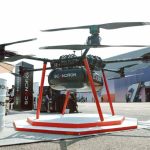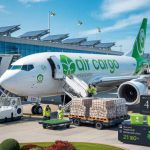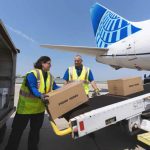WestJet Cargo: Caring for Animals in the Air
At WestJet Cargo, transporting live animals goes beyond logistics—it’s a mission rooted in animal welfare. Executive Vice President Kirsten de Bruijn highlights WestJet Cargo’s commitment to exceeding regulatory standards through breed-specific care and veterinary collaboration.
Live animals, whether pets, exotic species or for livestock breeding, must be transported safely.
At WestJet Cargo, this commitment to animal welfare is central to everything they do.
With Kirsten de Bruijn, WestJet Cargo’s Executive Vice President, Air Cargo Update explores how the airline goes beyond regulatory compliance, providing breed-specific care and working closely with veterinarians for safe and humane animal transportation.
Animal transportation isn’t just about moving animals to a new location, it’s also about creating a safe, comfortable, and stress-free environment for each species.
Canada’s WestJet Cargo prioritizes animal well-being in all its operations, from reuniting families with pets to supporting conservation efforts.
Global Regulations Guiding Animal Transport
Cargos carrying live animals are subject to a complex web of regulations and guidelines, designed to ensure the safety and welfare of these precious cargo.
At the forefront of these regulations is the International Air Transport Association’s (IATA) Live Animals Regulations (LAR), which provides a comprehensive framework for the transportation of live animals by air and set the global standard for safely transporting live animals by air.
It provides up-to-date, efficient practices to help ensure smooth live animal shipments, avoiding delays and ensuring compliance with both international and local regulations.
The LAR includes:
- Current airline and government requirements for transporting live animals.
- Guidelines on handling, marking, and labeling.
- Essential documentation needed for animal transport.
- A detailed classification of thousands of animal species with specific container requirements.
- Advice on non-air transport of live animals.
“At WestJet Cargo, we strictly follow the global standards set by the IATA Live Animals Regulations (LAR). However, we pride ourselves on going above and beyond the minimum requirements. For us, the well-being of animals is paramount. Not only do we ensure that animals are housed in IATA-compliant kennels that are secure, well-ventilated, and appropriately sized, but we also work closely with veterinarians during the transport process.
“Our team is trained to handle specific breeds with additional care, such as brachycephalic animals during the summer. We also have detailed protocols that vary by region to ensure compliance with local regulations, ensuring a smooth experience wherever the animal travels.”
LAR is the gold standard for industry best practices.
These regulations cover every aspect of live animal transport, from kennel design and animal handling to veterinary care and emergency procedures.
From species-specific guidelines to detailed protocols for handling and caring for animals, IATA’s LAR provides a roadmap for cargo carriers seeking to prioritize animal welfare.
Due to the complexity and ever-evolving nature of live animal transport, it’s crucial for cargo carriers to stay informed about the latest regulations and guidelines.
By doing so, they can ensure that their operations are not only compliant but also aligned with the latest best practices in animal welfare.
Step-by-Step Process of Transporting Live Animals
While transporting live animals requires meticulous planning and attention to detail, WestJet Cargo’s comprehensive process ensures the safe and humane transportation of your precious cargo.
From booking to arrival, every step is carefully designed to prioritize the well-being of the animals in their care.
| Stage | Description |
| Booking | Specialized support and partnerships with freight forwarders and IPATA agents. |
| Kennel Preparation | IATA-compliant kennels verified for safety and comfort. |
| Pre-Flight | Temperature-controlled, quiet areas for animals. |
| Arrival | Swift and safe handovers with clear communication. |
“At WestJet Cargo, we’ve designed a customer-focused process to ensure the safety and comfort of animals throughout their journey. We offer specialized booking support through freight forwarders and IPATA agents, making sure every detail is handled from the start. Pet owners just provide us with the necessary details, and we take care of the rest to ensure a smooth experience.
“We also make sure that all kennels meet IATA regulations, with our ground staff checking that they’re secure, well-ventilated, and equipped with absorbent materials. Pet safety and comfort are our top priority from drop-off to arrival.
“Before the flight, animals are kept in a secure, quiet, and temperature-controlled space to reduce stress. And when they arrive, we ensure a smooth handover with clear communication to the recipient.
“What really sets us apart is our real-time updates—pet owners are kept informed at every stage of their companion’s journey.”
Temperature-Controlled, Quiet Areas for Animals
To ensure the comfort and safety of your animal, WestJet Cargo’s facilities are designed to provide a peaceful and serene environment.
The temperature-controlled areas are carefully monitored to ensure that the animal is kept at a comfortable temperature, reducing the risk of heat stress or discomfort pre -flight.
| Step | Description |
| Kennel Placement | Placing the kennel in a temperature-controlled, quiet area. |
| Temperature Monitoring | Monitoring the temperature to ensure the animal’s comfort. |
| Loading Preparation | Preparing the kennel for loading onto the aircraft. |
“At WestJet Cargo, we tailor our transportation approach to meet the specific needs of each animal. We’re very strict about kennel size, ventilation, and making sure animals have enough space to move comfortably. Our pilots maintain stable temperature and air pressure in the cargo hold to ensure a safe environment throughout the flight,” de Bruijn explains.
“While we can’t directly monitor the animals during the flight, our staff performs welfare checks before loading, during the process, and immediately upon landing to make sure they are safe and stress-free. Whether it’s a small pet or a larger animal, we go beyond the basics to ensure a smooth and comfortable journey.”
According to IATA, the following table outlines the optimal conditions maintained in the cargo hold:
| Condition | Optimal Range |
| Temperature | 10°C to 21°C (50°F to 70°F) |
| Air Pressure | Between 10,000 and 12,000 feet above sea level |
On the ground, WestJet Cargo’s team ensures that kennels are designed and prepared to meet the specific needs of each species.
This includes:
| Kennel Requirement | Why It Matters |
| IATA-compliant kennel size | To ensure the animal has enough space to stand up, turn around, and lie down comfortably. |
| Secure and absorbent materials | To prevent escape and minimize mess during transport. |
| Ventilation systems | To maintain a comfortable air quality and prevent respiratory issues. |
| Temperature control | To regulate the animal’s body temperature and prevent heat stress or hypothermia. |
Size matters when it comes to kennels.
WestJet Cargo ensures that kennels are specifically designed to accommodate the size and breed of the animal, providing enough space for comfort and minimizing the risk of injury or stress.
Staff Training and Emergency Protocols
All WestJet Cargo ground handlers are IATA-certified and undergo rigorous training to ensure they are equipped to handle the unique demands of transporting live animals.
This training goes beyond the basics, covering topics such as animal behavior, species-specific requirements, and emergency procedures.
This comprehensive training program enables ground handlers to identify potential issues before they arise, taking proactive steps to mitigate risks and ensure the safety and well-being of the animals.
In the unlikely event of an emergency or diversion, WestJet Cargo’s trained staff springs into action, following established procedures to mitigate risks and ensure the animals receive the care they need.
From communicating with customers to coordinating with veterinarians, WestJet Cargo’s emergency protocols are designed to provide a swift and effective response.
“All our ground handlers are certified under IATA’s Live Animal Regulations, so they’re fully trained to handle animals and respond quickly in case of emergencies. Our team is ready for any situation, and if a flight is ever diverted, we immediately work with local veterinarians and customer service to ensure the animals in our care are well looked after.
“What really sets us apart is our focus on preparation and transparency. Our customer service team is always aware of any special cargo onboard, ensuring clear communication and quick solutions in any scenario.”
Collaboration with Veterinarians and Experts
Not all animals are created equal, and each species has its unique set of needs and challenges when it comes to transportation.
Animal transportation can be a stressful experience for many animals, and stress can lead to anxiety, which can have severe consequences on their health.
When animals are separated from their owners, they may feel anxious or scared, leading to increased heart rates, breathing difficulties, and even self-injury.
According to the International Air Transport Association (IATA), stress and anxiety are among the most common health issues affecting animals during transportation.
Stress and anxiety can also be exacerbated by environmental factors such as temperature fluctuations, noise, and changes in air pressure.
With the guidance of veterinarians and experts, WestJet Cargo is able to manage special cases that require extra care and attention.
This may include animals with specific medical needs, such as those requiring medication or specialized equipment, or those that are particularly sensitive to temperature fluctuations or other environmental factors.
In these cases, WestJet Cargo works closely with the veterinarians and experts to develop customized care plans that address the unique needs of each animal.
This may involve modifying the transportation process to minimize stress and discomfort or providing additional support and care during the journey.
“We partner closely with veterinarians and animal welfare experts to uphold the highest standards of care. Our collaboration ensures that each animal’s unique needs are addressed, particularly for specialized cases like transporting brachycephalic breeds, where we consult with vets during the booking process to guarantee their safety every step of the way.
“We also recognize that stress and anxiety are the most common challenges animals face during air travel, so we create a calm, quiet, and temperature-regulated environment before the flight. To provide additional comfort, we allow pets to bring their favorite toys or blankets along, helping to ease their journey.”
Dogs and Cats as Frequent Travelers
An estimated 70% of WestJet Cargo’s live animal shipments consist of dogs and cats, making them the most common species transported by the airline.
Dogs and cats require special attention to ensure their comfort and safety during transport.
WestJet Cargo’s staff is trained to handle these animals with care, providing a calm and comfortable environment that minimizes stress and anxiety.
From providing familiar objects like toys or blankets to ensuring the correct temperature and ventilation in the cargo hold, WestJet Cargo goes above and beyond to ensure the safe and humane transportation of dogs and cats.
Across the animal kingdom, certain breeds require extra attention due to their physical characteristics.
Brachycephalic breeds, such as pugs, bulldogs, and Persian cats, are prone to respiratory issues and heat stress.
WestJet Cargo takes extra precautions when transporting these breeds, particularly during summer months when heat can be a concern.
The team ensures that these animals are provided with additional ventilation, temperature control, and monitoring to prevent any potential health issues.
Technological Advancements
In today’s digital world, having access to real-time information is crucial for reducing uncertainty and enhancing peace of mind.
WestJet Cargo understands this need and has introduced a variety of technological solutions aimed at keeping customers informed at every stage of the process.
Their advanced tracking systems and real-time updates showcase the company’s commitment to exceeding the basic requirements of animal transport.
“As a carrier, WestJet Cargo does not have the ability to speak for the rest of the industry, but we utilize state-of-the-art tracking systems to provide real-time updates to customers, which helps create a better service experience and enhanced customer confidence.
“For pet owners, WestJet Cargo offers a seamless way to communicate with the carrier. We have a dedicated customer service team available over the course of the day to answer any questions you may have. Using an online tracking tool, customers can see when the PET’s flight has taken off and landed.”














